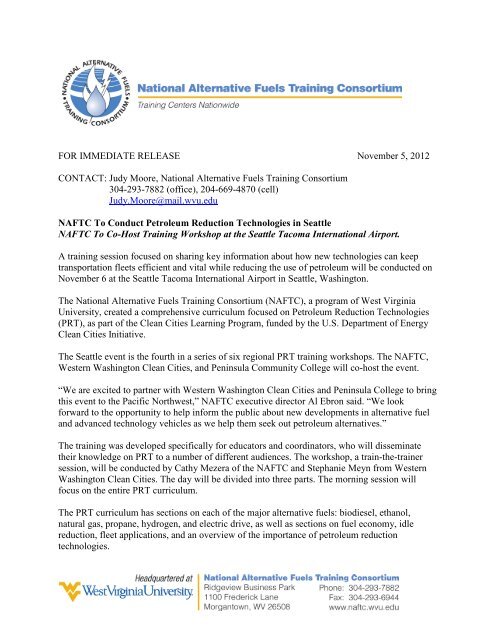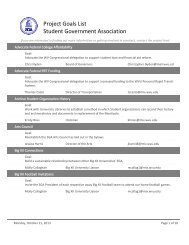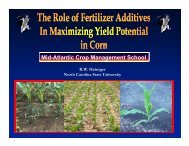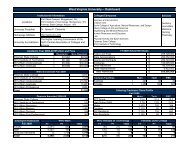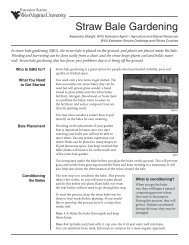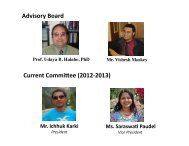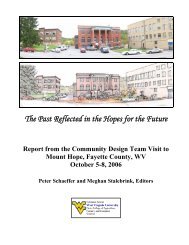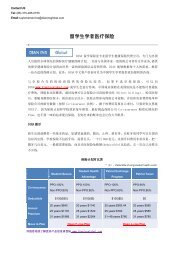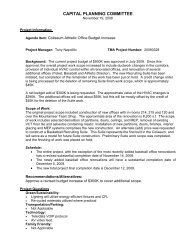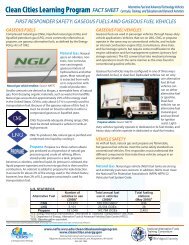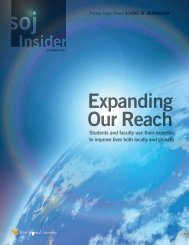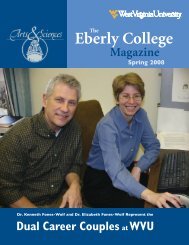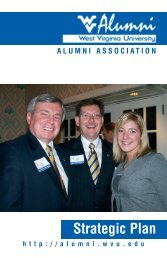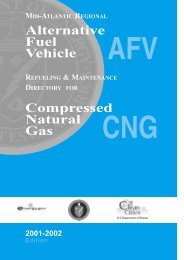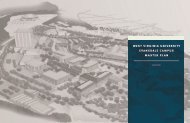NAFTC To Conduct Petroleum Reduction Technologies in Seattle
NAFTC To Conduct Petroleum Reduction Technologies in Seattle
NAFTC To Conduct Petroleum Reduction Technologies in Seattle
You also want an ePaper? Increase the reach of your titles
YUMPU automatically turns print PDFs into web optimized ePapers that Google loves.
FOR IMMEDIATE RELEASE November 5, 2012<br />
CONTACT: Judy Moore, National Alternative Fuels Tra<strong>in</strong><strong>in</strong>g Consortium<br />
304-293-7882 (office), 204-669-4870 (cell)<br />
Judy.Moore@mail.wvu.edu<br />
<strong>NAFTC</strong> <strong>To</strong> <strong>Conduct</strong> <strong>Petroleum</strong> <strong>Reduction</strong> <strong>Technologies</strong> <strong>in</strong> <strong>Seattle</strong><br />
<strong>NAFTC</strong> <strong>To</strong> Co-Host Tra<strong>in</strong><strong>in</strong>g Workshop at the <strong>Seattle</strong> Tacoma International Airport.<br />
A tra<strong>in</strong><strong>in</strong>g session focused on shar<strong>in</strong>g key <strong>in</strong>formation about how new technologies can keep<br />
transportation fleets efficient and vital while reduc<strong>in</strong>g the use of petroleum will be conducted on<br />
November 6 at the <strong>Seattle</strong> Tacoma International Airport <strong>in</strong> <strong>Seattle</strong>, Wash<strong>in</strong>gton.<br />
The National Alternative Fuels Tra<strong>in</strong><strong>in</strong>g Consortium (<strong>NAFTC</strong>), a program of West Virg<strong>in</strong>ia<br />
University, created a comprehensive curriculum focused on <strong>Petroleum</strong> <strong>Reduction</strong> <strong>Technologies</strong><br />
(PRT), as part of the Clean Cities Learn<strong>in</strong>g Program, funded by the U.S. Department of Energy<br />
Clean Cities Initiative.<br />
The <strong>Seattle</strong> event is the fourth <strong>in</strong> a series of six regional PRT tra<strong>in</strong><strong>in</strong>g workshops. The <strong>NAFTC</strong>,<br />
Western Wash<strong>in</strong>gton Clean Cities, and Pen<strong>in</strong>sula Community College will co-host the event.<br />
“We are excited to partner with Western Wash<strong>in</strong>gton Clean Cities and Pen<strong>in</strong>sula College to br<strong>in</strong>g<br />
this event to the Pacific Northwest,” <strong>NAFTC</strong> executive director Al Ebron said. “We look<br />
forward to the opportunity to help <strong>in</strong>form the public about new developments <strong>in</strong> alternative fuel<br />
and advanced technology vehicles as we help them seek out petroleum alternatives.”<br />
The tra<strong>in</strong><strong>in</strong>g was developed specifically for educators and coord<strong>in</strong>ators, who will dissem<strong>in</strong>ate<br />
their knowledge on PRT to a number of different audiences. The workshop, a tra<strong>in</strong>-the-tra<strong>in</strong>er<br />
session, will be conducted by Cathy Mezera of the <strong>NAFTC</strong> and Stephanie Meyn from Western<br />
Wash<strong>in</strong>gton Clean Cities. The day will be divided <strong>in</strong>to three parts. The morn<strong>in</strong>g session will<br />
focus on the entire PRT curriculum.<br />
The PRT curriculum has sections on each of the major alternative fuels: biodiesel, ethanol,<br />
natural gas, propane, hydrogen, and electric drive, as well as sections on fuel economy, idle<br />
reduction, fleet applications, and an overview of the importance of petroleum reduction<br />
technologies.
The second part of the day’s tra<strong>in</strong><strong>in</strong>g will beg<strong>in</strong> with a demonstration on “The Importance of<br />
Electric Drive: The Compell<strong>in</strong>g Case for Electric Drive <strong>in</strong> Ground Support Equipment at<br />
<strong>Seattle</strong>-Tacoma Airport” by Meyn and Angela Hawk of Alaska Airl<strong>in</strong>es. Participants <strong>in</strong> the<br />
tra<strong>in</strong><strong>in</strong>g will then have the opportunity to tour the <strong>Seattle</strong> Tacoma International Airport’s<br />
facilities; the airport uses every major alternative fuel except ethanol <strong>in</strong> its daily operations.<br />
The day will conclude with presentations on natural gas fleet applications. Representatives from<br />
Yellow Cab <strong>Seattle</strong> will discuss their fleet experience with natural gas.<br />
###<br />
About the Clean Cities Learn<strong>in</strong>g Program and the <strong>NAFTC</strong>.<br />
The Clean Cities Learn<strong>in</strong>g Program is a project funded by a grant from the U.S. Department of<br />
Energy (DOE) Clean Cities Initiative under Award Number DE-EE0001696. Developed by the<br />
National Alternative Fuels Tra<strong>in</strong><strong>in</strong>g Consortium (<strong>NAFTC</strong>), West Virg<strong>in</strong>ia University, and its<br />
partners, the Clean Cities Learn<strong>in</strong>g Program will raise awareness and foster a greater<br />
understand<strong>in</strong>g of alternative fuel and advanced technology vehicles. This effort will provide<br />
Clean Cities coalitions and other stakeholders with state-of-the art curricula and tra<strong>in</strong><strong>in</strong>g,<br />
education and outreach materials, and a concentrated market<strong>in</strong>g and communications plan.<br />
One of the most unique aspects of this project is the focus on develop<strong>in</strong>g a nationwide<br />
partnership between U.S. DOE Clean Cities coalitions and <strong>NAFTC</strong> National Tra<strong>in</strong><strong>in</strong>g Centers.<br />
This partnership will provide target audiences with awareness and technical education that<br />
encourage decisions to adopt vehicles and fuels that will significantly reduce the consumption of<br />
petroleum-based fuels. The project <strong>in</strong>cludes the development of two curriculums, First<br />
Responder Safety Tra<strong>in</strong><strong>in</strong>g and <strong>Petroleum</strong> <strong>Reduction</strong> <strong>Technologies</strong>.<br />
The National Alternative Fuels Tra<strong>in</strong><strong>in</strong>g Consortium (<strong>NAFTC</strong>), a program of West Virg<strong>in</strong>ia<br />
University, was founded <strong>in</strong> 1992. The <strong>NAFTC</strong> manages education and outreach programs and<br />
activities, develops curricula, and conducts tra<strong>in</strong><strong>in</strong>g on subject matter related to alternative fuel<br />
and advanced technology vehicles. The <strong>NAFTC</strong> works with colleges, community colleges and<br />
high schools around the country to develop tra<strong>in</strong><strong>in</strong>g programs for dissem<strong>in</strong>ation at the local level.<br />
The organization consists of approximately 50 National and Associate Tra<strong>in</strong><strong>in</strong>g Centers that<br />
utilize its curriculum and tra<strong>in</strong><strong>in</strong>g materials. The <strong>NAFTC</strong> is also the developer and coord<strong>in</strong>ator of<br />
National Alternative Fuel Vehicle (AFV) Day Odyssey, the largest nationwide promotion and<br />
education event for alternative fuel and advanced technology vehicles.


